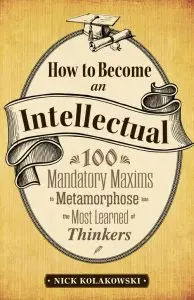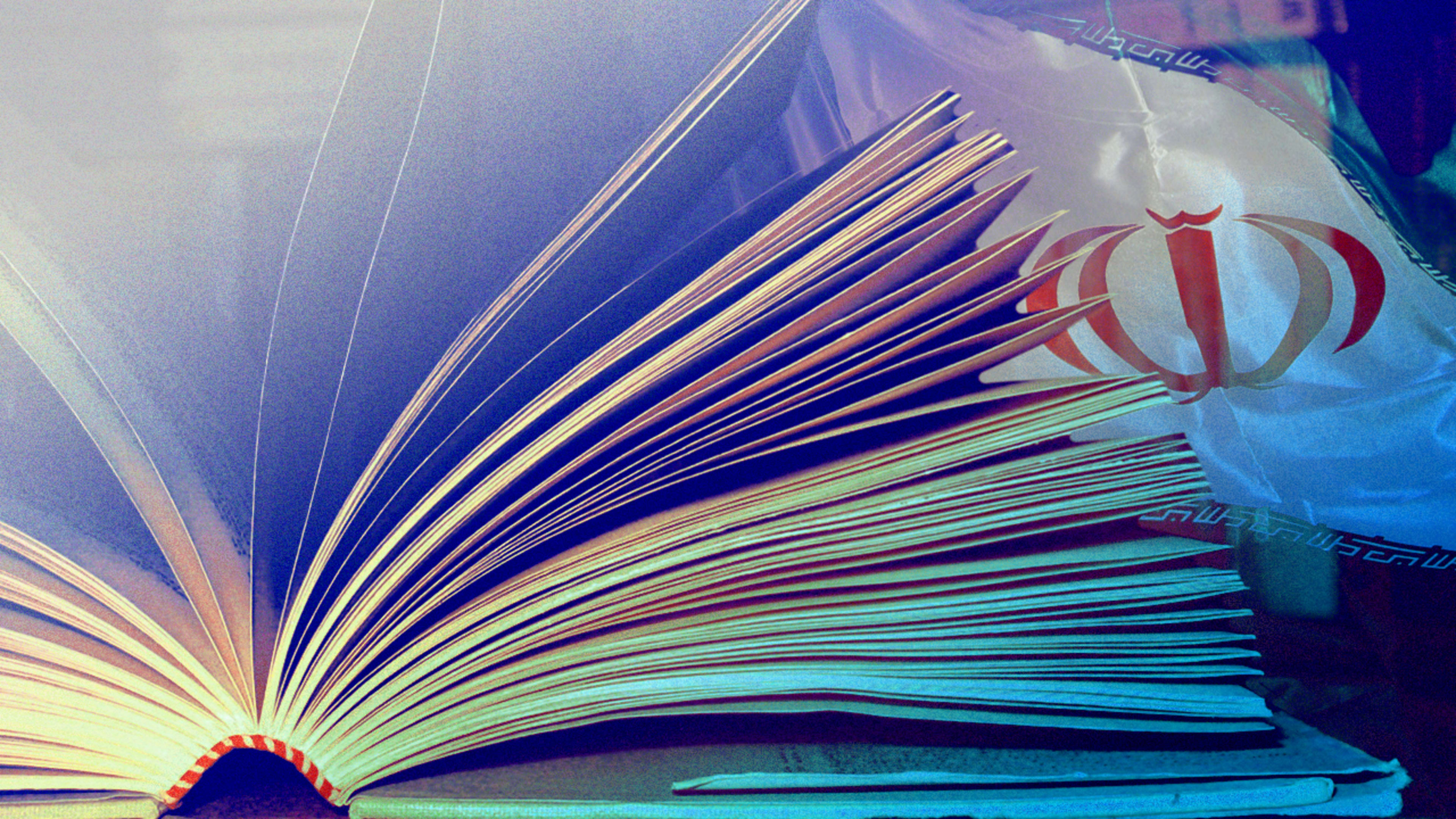Even a forgotten book can occasionally enjoy a second life, whether the author wants one for it or not.
Six years ago, I wrote a short comedy piece for McSweeney’s Internet Tendency titled “Friedrich Nietzsche, Chain-Restaurant Bartender,” in which I imagined the adorably morose philosopher berating a hipster barfly for not becoming an Übermensch. (“I will pour you something strong now, to arouse your sleeping righteousness. You must face yourself!”) On the strength of that piece, I landed a book contract, which eventually resulted in How to Become an Intellectual, a tongue-in-cheek satire of intellectualism and cultural elitism.
That book might have broken a world record for the number of Proust-centric jokes stuffed into 242 pages, but sadly it failed to ignite the popular imagination. After a few months in the “Comedy” section of Barnes & Noble, it drifted into the netherworld of out-of-print books, popping up occasionally in used bookstores and remainder catalogs. My publisher became a subsidiary of Simon & Schuster, which continued to send me lack-of-royalty statements at regular intervals, reminding me how much money the book wasn’t earning.
But on the other side of the world, people had decided my send-up of academia had actual academic value. In December of last year, I received an email from someone purporting to be a professor from Iran. The message, caught in my spam filter, featured an intriguing subject line: “Introducing the book in Academic Secession: How to Become an Intellectual.” If it was spam, at least it earned points for ingenuity, so I opened it:
“I am Prof. Mohsen Khalili, Head of Department of Political Science at Ferdowsi University of Mashhad, Iran… I will introduce your book (How to Become an Intellectual) in Saturday (Dec. 9) in my class. Would you please send a short message (what you want) for me and my students?”
After some internet research, I discovered there was indeed a professor named Mohsen Khalili at the University of Mashhad, which is in northeastern Iran, near the border of Turkmenistan. Unbeknownst to me, my book had been acquired by an Iranian publisher, Hanooz, whose catalog included titles such as Life Lessons from Nietzsche (Hi, Friedrich!) and How to Enjoy Our Loneliness (heavy!). Someone named Babak Mazloumi had apparently translated my prose into Persian.
I had so many questions. Chief among them: Did Khalili know the book was satire? How did the decades-long U.S. sanctions against Iran factor into this weird and unexpected equation? And tangent to that: How did a country that bans alcohol handle the sizable chapter in which I discussed curating one’s liquor cabinet “the intellectual way”?
Google Translate, although an imperfect engine, provided some insight into the satire aspect: The publisher’s summary suggested that the book was indeed “humorous,” and would teach the reader “how to put the true intellectuals behind, so that the intellectuals do not get around you.” (Although machine translation has improved exponentially over the past few years, that description still read like a distressingly academic game of touch football.)
Next, I found my book in the online catalog of the National Library and Archives Organization of the Islamic Republic of Iran. Its presence there hinted that someone official had approved the translation, despite the text featuring the aforementioned risqué elements that, I imagined, would have a hard time escaping the red pen of a religious censor. Forget the aforementioned alcohol chapter, which you could vaporize with a few clicks; the text is riddled with potentially questionable riffs like this one: “The only reason Vitellius, Commodus, Nero, or any other imperial miscreants didn’t drive a Bentley into a hotel pool at the climax of a cocaine-fueled bender is that Rome fell centuries before the creation of the internal combustion engine or hard drugs.”
How does something like that merrily sail past a gatekeeper in a country where being caught drinking too many times is grounds for the death penalty? I needed to know.
To answer those questions, I tracked down Babak Mazloumi, the translator. He had earned a master’s from NYU, specializing in contemporary Persian literature and literary translation. He had read How to Become an Intellectual soon after it came out in 2012, and tried contacting me about translating it into Persian, but those messages never made it to my inbox; an overzealous spam filter, perhaps.
“I usually contact the writers when I can,” he wrote in a text message. “It makes everything more friendly. I did the same with Robert Coover.” (As proof, he emailed a recommendation letter by Coover, on Brown University stationery, that praised Mazloumi’s diligence; it also stated: “At least half of the writing of mine that he has translated has been rejected by the state and religious censors, but he keeps trying.”)
“The publisher is not able to control anything after they submit it to censorship,” Mazloumi added. “Specifically, regarding alcohol and drugs. Those parts [in your book] were not deleted because you said people should not use them.”
While he hadn’t heard of anyone teaching the book, he offered a bit of insight into what Khalili might have intended: “Maybe they read the book as an extracurricular activity. In Iran, professors do not choose the curriculum.”
Shared Culture, Worlds Apart
In one of those grand coincidences, Khalili’s email, and my subsequent conversation with Mazloumi, took place just as the tensions between Iran’s government and its people reached the boiling point. Unrest sparked in multiple cities across the country, with crowds protesting everything from the high unemployment rate to government corruption; hundreds were arrested, and at least 20 were killed. It was the biggest such event since the Green Movement in 2009 (known in some quarters as the Persian Spring), when people took to the streets to demand the removal of hardliner president Mahmoud Ahmadinejad.
Iran’s Revolutionary Guards blamed December’s chaos on the “United States, Britain, the Zionist regime (Israel), Saudi Arabia, the hypocrites (mujahideen) and monarchists,” according to an official statement. In a bid to further squelch Western influences, Iranian primary schools will reportedly stop teaching English.
Yet despite stringent censorship and other repressive practices, outside culture still manages to percolate to the people, often through pirated movies, TV shows, and books–and my own book was living proof.

By the time I contacted Mazloumi, I had already been in touch with my publisher, which had no idea that one of their out-of-print books had made it through this cultural firewall. “This book was not licensed or authorized in any way,” came the response from Simon & Schuster, when I sent an email detailing the situation. It had been “translated and published in Persian in violation of international copyright law.” Not only was there no legal recourse, apparently I wouldn’t see any royalties from book sales to Khalili’s students.
“The situation is largely driven by the sanctions against Iran,” my contact at Simon & Schuster added. “The sanctions in place make it nearly impossible to enter a binding contract with a company based in Iran, and making payment from Iran to the U.S. is simply not possible due to banking sanctions.” As a result, Iran used copyrighted materials from the West “with impunity.”
This doesn’t just affect what ends up in Iranian bookstores; the sanctions (and the associated copyright issues) mean that Iranian schools rely heavily on unlicensed translations of textbooks from other countries.
How We Got Here
U.S. sanctions against Iran have existed since 1979, when the Iranian Revolution resulted in the seizure of the U.S. embassy in Tehran. Over the next three decades, the U.S. government steadily tightened the noose, prohibiting everything from the import and export of most products to any sort of financial interaction with Iran’s banks.
Although Iran has made noise about increased respect for intellectual property produced outside the country—at the Frankfurt Book Fair in 2016, for example, a number of Iranian publishers expressed a willingness to join the Universal Copyright Convention of Berne, despite some concerns about the sanctity of their own IP rights on the world stage—Iran hasn’t signed various international copyright agreements, ensuring that piracy remains rampant inside the country.
But Iran’s perspective on intellectual property may also evolve. Within the last year, there seems to have been more activity around revising Iran’s own copyright laws to respect international copyright, with government officials recognizing that a lack of agreements hampers the country’s attempts at international trade. But in the context of Iran’s relations with the U.S., such moves are likely moot: Even if Iranian publishers suddenly began respecting copyright, the banking prohibitions mean that American publishers (and thus American authors) couldn’t financially benefit from contracts or sales related to an Iranian translation.
“How much do you think you would receive [in royalties]? How much do you think I received for that?” Mazloumi wrote, when I brought up the issue. For him, translation was a question of love: “There’s almost no money in this.”
For American authors whose works end up translated and sold in Iran, the equation comes down to whether a relative loss in royalties is worth the chance to expand one’s ideas into a new context and reach a culture that might not otherwise have access to those ideas—a conundrum that neatly branches philosophy and commerce.
Given that my book, despite its satirical nature, is ultimately a celebration of the human intellect in all its myriad forms, part of me felt I couldn’t too strenuously protest someone’s attempt to use it in a classroom. No matter what the political machinations of our governments, and the restrictions they impose on their citizens, the exchange of ideas remains vital.
Recognize your brand’s excellence by applying to this year’s Brands That Matter Awards before the early-rate deadline, May 3.
